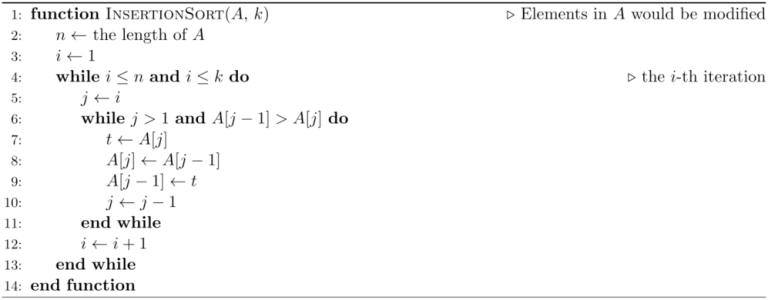C - Insertion Sort(数学规律题, 递推)
C - Insertion Sort(数学规律题, 递推)
Insertion sort is a simple sorting algorithm that builds the final sorted array one item at an iteration.
More precisely, insertion sort iterates, consuming one input element each repetition, and growing a sorted output list. At each iteration, insertion sort removes one element from the input data, finds the location it belongs within the sorted list, and inserts it there. It repeats until no input elements remain.
This type of sorting is typically done in-place, by iterating up the array, growing the sorted array behind it. At each array-position, it checks the value there against the largest value in the sorted array (which happens to be next to it, in the previous array-position checked). If larger, it leaves the element in place and moves to the next. If smaller, it finds the correct position within the sorted array, shifts all the larger values up to make a space, and inserts into that correct position.
The resulting array after k iterations has the property where the first k entries are sorted. In each iteration the first remaining entry of the input is removed, and inserted into the result at the correct position, thus extending the result.
Knuth is an ACM-ICPC master and provides a modified pseudocode implementation about the insertion sort for you. His modified algorithm for an array of sortable items A (1-based array) can be expressed as:

He notes that a permutation of 1 to n is almost sorted if the length of its longest increasing subsequence is at least (n−1).
Given the parameter k, you are asked to count the number of distinct permutations of 1 to n meeting the condition that, after his modified insertion sort, each permutation would become an almost sorted permutation.
Input
The input contains several test cases, and the first line contains a positive integer T indicating the number of test cases which is up to 5000.
For each test case, the only line contains three integers n,k and q indicating the length of the permutations, the parameter in his implementation and a prime number required for the output respectively, where 1≤n,k≤50 and 108≤q≤109.
Output
For each test case, output a line containing "Case #x: y" (without quotes), where x is the test case number starting from 1, and y is the remainder of the number of permutations which meet the requirement divided by q.
Example
Input
4
4 1 998244353
4 2 998244353
4 3 998244353
4 4 998244353
Output
Case #1: 10
Case #2: 14
Case #3: 24
Case #4: 24
Note
In the first sample case, we can discover 10 permutations which meet the condition, and they are listed as follows:
[1,2,3,4];
[1,2,4,3];
[1,3,2,4];
[1,3,4,2];
[1,4,2,3];
[2,1,3,4];
[2,3,1,4];
[2,3,4,1];
[3,1,2,4];
[4,1,2,3].
[思路]:根据题意进行模拟,可以打出对应的表,如下
1 0 0 0 0 0 0 0 0 0
2 2 0 0 0 0 0 0 0 0
5 6 6 0 0 0 0 0 0 0
10 14 24 24 0 0 0 0 0 0
17 26 54 120 120 0 0 0 0 0
26 42 96 264 720 720 0 0 0 0
37 62 150 456 1560 5040 5040 0 0 0
50 86 216 696 2640 10800 40320 40320 0 0
65 114 294 984 3960 18000 85680 362880 362880 0
82 146 384 1320 5520 26640 141120 766080 3628800 3628800
根据表可以发现对应的规律,先去掉达到n!的不看
那么容易得到 f[i][j] = (f[i - 1][j - 1] * j) + (j * (j - 1) * te[i - 2][j - 1])
te数组下文解释
举个例子:我们可以发现
54 = 14 * 3 + 2 * 3 * 2
264 = 54 * 4 + 3 * 4 * 4
1560 = 264 * 5 + 4 * 5 * 12
可以得知最后一项2 4 12
2 * 2 = 4 * 3 = 12 * 4 = 48 ......
以此来推导出te数组
1
2 1
3 2
4 3 4
5 4 6 12 ..........
那么容易得到上述的递推公式,即可ac该题
#include <iostream>
#include <cstdio>
#include <cstring>
using namespace std;
typedef long long LL;
LL arr[55][55];
LL te[55][55];
void Init(LL p){
arr[1][1] = 1;
int x = 1;
for(LL i = 2; i <= 50; i ++){
arr[i][1] = arr[i - 1][1] + x;
x += 2;
}
for(LL j = 2; j <= 50; j ++){
for(LL i = j + 1; i <= 50; i ++){
arr[i][j] = ((arr[i - 1][j - 1] % p * j % p )%p + (j % p * (j - 1) % p * te[i - 2][j - 1] % p) % p) % p;
//cout << arr[i][j] << " " << te[i - 1][j - 1] << endl;
}
}
}
void Inits(LL p){
for(LL i = 1; i <= 55; i ++){
te[i][1] = i;
te[i + 1][2] = i;
}
for(LL j = 3; j <= 55; j ++){
for(LL i = 3; i <= 55; i ++){
te[i][j] = (te[i - 1][j - 1] * (j - 1)) % p;
}
}
}
LL jiecheng(int x, int p){
LL sum = 1;
for(LL i = 1; i <= x; i ++){
sum = (sum * i) % p;
}
return sum;
}
int main(){
int T;
ios::sync_with_stdio(false);
cin >> T;
int cases = 0;
while(T --){
LL n, k, p;
cin >> n >> k >> p;
Inits(p);
Init(p);
if(arr[n][k] == 0){
cout << "Case #" << ++cases << ": " << jiecheng(n, p) << endl;
}
else{
cout << "Case #" << ++cases << ": " << arr[n][k] << endl;
}
}
return 0;
}



【推荐】编程新体验,更懂你的AI,立即体验豆包MarsCode编程助手
【推荐】凌霞软件回馈社区,博客园 & 1Panel & Halo 联合会员上线
【推荐】抖音旗下AI助手豆包,你的智能百科全书,全免费不限次数
【推荐】轻量又高性能的 SSH 工具 IShell:AI 加持,快人一步